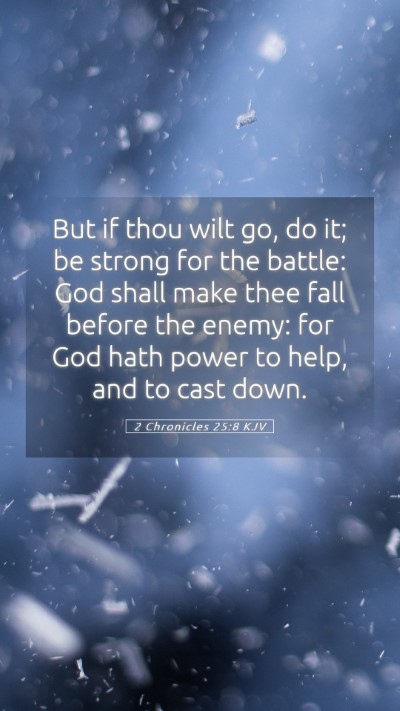Understanding 2 Chronicles 25:8
Bible Verse: 2 Chronicles 25:8 - "But if you go, be strong for the battle; God will overthrow you before the enemy, for God has power to help and to overthrow."
Overview
This verse comes from the story of King Amaziah of Judah, who is confronted by a prophet concerning his military endeavors. This part of the Scripture offers vital insights into divine guidance, human decisions, and the reality of God's sovereignty in our lives.
Bible Verse Meanings and Interpretations
The verse serves as a powerful reminder of the consequences of ignoring God's counsel. When analyzing the meanings of this verse, we may consider the following insights:
- Divine Authority: The message emphasizes God's supreme authority over the affairs of men, particularly in battle. It suggests that God can decide the fate of anyone engaged in warfare, indicating His control over all situations.
- Warning Against Presumption: The verse warns those who might feel confident without seeking God's approval. Amaziah's initial decision to hire mercenaries showcases a lack of dependence on God.
- God's Omnipotence: The phrase "God has power to help and to overthrow" highlights the duality of God's nature. As He can provide assistance, He can also allow defeat—serving as a reminder to trust in His plan.
- Preparation for Struggle: The admonition to "be strong for the battle" invites a recognition of the necessity of preparing oneself for challenges, both physically and spiritually, depending on God's strength.
Commentary Insights
Consulting notable biblical commentators reveals further depths to this text:
- Matthew Henry: He emphasizes the serious nature of Amaziah's rebellion against God, drawing a parallel to how individuals today may rely on their strength rather than divine grace. Henry argues that one must heed God’s warnings to avoid fatal errors.
- Albert Barnes: Barnes discusses the context, highlighting the importance of divine intervention in human affairs. He indicates that Israel’s downfall was necessary to teach Amaziah the significance of worshiping God alone, reminding readers that spiritual fidelity is crucial.
- Adam Clarke: Clarke elaborates on the importance of God’s providence in warfare, mentioning that victories are not simply a result of human effort but largely stem from God’s will. He warns that human preparations might be undermined if they do not align with God’s purposes.
In-Depth Bible Verse Analysis
To further enrich our understanding, it's essential to explore the broader context surrounding this verse:
- Historical Context: This passage is placed during a tumultuous period in Israel's history where kings often struggled for power and glory, often neglecting their spiritual obligations. Understanding the history helps frame Amaziah’s decisions and his spiritual decline.
- Character Study: Analyzing King Amaziah’s character reveals his initial faith and courage but also his later foolishness in ignoring a prophet's advice. This provides a case study in the consequences of disobedience and pride.
- Theological Implications: The verse brings to light several theological themes: the sovereignty of God, the importance of obedience, and the reality of divine judgment when one strays from faith.
Application of Bible Verse
From this verse, believers can draw practical applications for their lives:
- Seek God’s Guidance: Just as Amaziah received a warning, individuals today should consistently seek God's guidance in their decisions, particularly those involving significant life changes.
- Recognize Personal Limits: Understanding that self-reliance can lead to failure encourages believers to humble themselves and trust in God’s capability to aid them.
- Prepare Spiritually: The call to be strong for battle serves as an encouragement for Christians to fortify their spiritual lives, engaging in prayer, study, and community support.
Cross References
This verse relates closely to several other passages in the Bible, enhancing its meaning:
- 1 Samuel 14:6: Jonathan’s faith in God’s ability to save his people emphasizes God’s involvement in battles.
- 2 Chronicles 20:15: Jehoshaphat’s prayer and God’s promise to fight for His people parallels Amaziah’s circumstances.
- James 4:10: This New Testament verse reiterates the theme of humility before God, linking it back to the importance of seeking God’s will.
Conclusion
In summary, 2 Chronicles 25:8 encapsulates pivotal themes of divine guidance, human responsibility, and the reality of God's sovereignty. By studying this verse and reflecting on its implications, both individually and within bible study groups, believers can gain valuable insights into how they can navigate life's challenges and maintain their faithfulness to God. Whether through online Bible studies or personal reflection, the understanding Scripture becomes an enriching journey, leading to deeper biblical exegesis and practical applications in daily life.
As believers continue their bible study lessons, they will find that these scriptural analyses serve not only to enlighten their minds but also to inspire their hearts toward a greater commitment to understanding God's word and His will in their lives.


